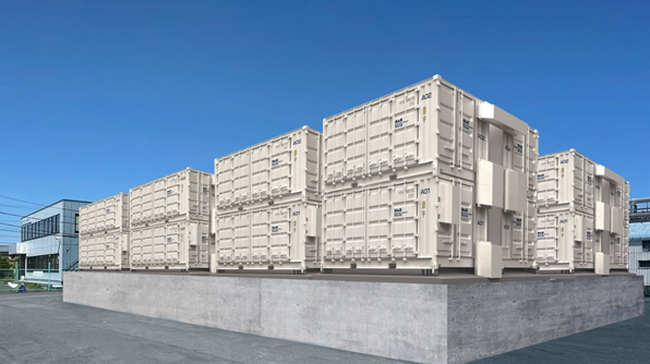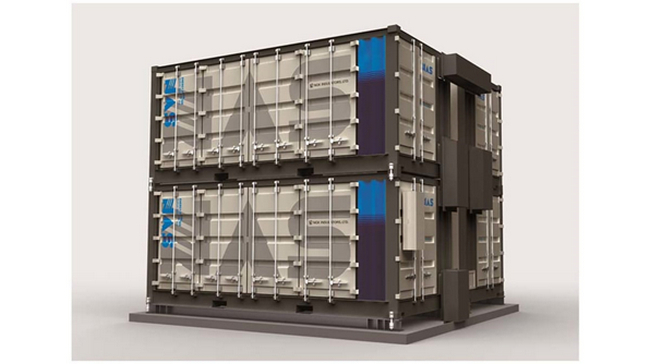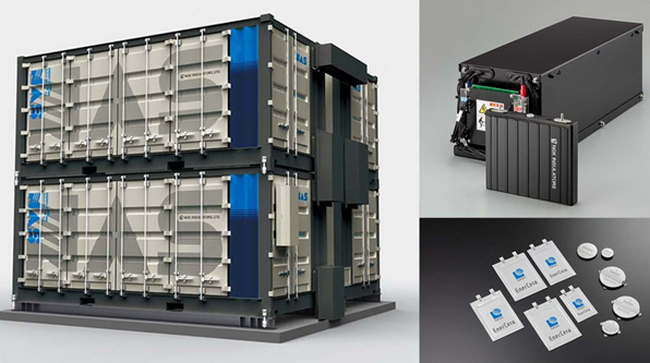Displaying items by tag: NGK
NGK Receives Order for NAS Batteries Intended for Energy Storage Facility of SALA ENERGY
NGK INSULATORS, LTD. (hereinafter, “NGK”) has received an order for NAS® batteries for electrical power storage intended as those for an energy storage facility from SALA ENERGY CO., LTD. (hereinafter, “SALA ENERGY”), which is a subsidiary of SALA Corporation engaged in the energy business.
The NAS batteries have a capacity of 69,600 kWh (69.6 MWh) and can store electrical power equivalent to one day’s worth of electric power consumption by approximately 6,000 average households. The batteries will be directly connected to the electrical power grid at the SALA Hamamatsu Storage Station, which is located in Hamamatsu City. They are intended to stabilize the supply and demand of electrical power by storing electrical power when there is an excess supply and discharging it during shortages. As NAS batteries are featured with the large capacity and capable of continuous discharge for the long period, they can be used for multiple applications. SALA ENERGY plans to use energy stored in the batteries for trading in various electricity markets such as the supply and demand adjustment markets and capacity markets, as well as reducing the cost of procuring electrical power through arbitrage (*1) via the wholesale electrical power market. The NAS batteries are being introduced following SALA ENERGY’s selection as a business operator in the “Project to Support the Introduction of Storage Battery Systems and Water Electrolysis Equipment for Power Grids (Revised Budget FY2022)” (*2) led by the Sustainable open Innovation Initiative, which has been entrusted by the Agency for Natural Resources and Energy to implement the support business. It is expected that the NAS batteries will help to stabilize the supply and demand of electrical power, along with contributing to the expanded use of renewable energy, which can fluctuate significantly.
Although further introduction of renewable power generation, including solar and wind power, is anticipated as part of efforts to achieve carbon neutrality, the fact that the amount of power generated is affected by seasons and weather presents a challenge for renewable energy. Furthermore, managing the tightening supply and demand of electrical power due to factors such as climate change has become a social issue. Charging and discharging batteries for grid storage in line with supply and demand for electrical power can help to solve these issues.
NAS batteries are used in various applications including stabilization of renewable energy, electric power demand and supply balancing, and emergency power sources. They have so far been installed in over 250 locations worldwide and have a stable operational track record of more than 20 years. NGK will continue to meet the demand for large capacity storage batteries, such as those for grid storage, strive to promote the spread of renewable energy and stabilize the supply and demand for electrical power, while helping to realize a carbon-neutral society.
 image of NAS batteries to be installed at energy storage station
image of NAS batteries to be installed at energy storage station
Overview of the Ordered NAS Battery
|
Installation site |
SALA Hamamatsu Storage Station (Hamamatsu City, Shizuoka Prefecture) |
|
Capacity |
69,600 kilowatt-hours (69.6 megawatt-hours) |
|
Units installed |
48 (container type) |
|
Applications |
Adjustment to supply and demand for electrical power, and provision of electrical power to capacity markets, supply and demand adjustment markets, wholesale markets and others |
|
Start of construction |
July 2023 |
|
Start of operation |
Spring 2026 (planned) |
About NAS batteries
NAS batteries are a megawatt class large-capacity storage battery, implemented practically for the first time in the world by NGK. The batteries feature large capacity, high energy density (compact), and long life, and can provide a stable supply of electric power with a high output over long periods of time. They have been installed at over 250 locations worldwide, with a total output of over 720,000 kW (720 MW) and total capacity of approx. 5.0 million kWh (5,000 MWh) installed. They are used for various applications, including peak cutting through load balancing and emergency power supply, as well as stabilization of renewable energy and construction of smart grids, thereby contributing to reduced environmental load and realization of carbon neutrality. NAS batteries have obtained the certification based on stationary storage battery safety standard UL 1973 (cell and module level) and a test report based on UL 9540A standard (*3), which is to verify batteries and storage battery systems fire risk, for confirming compliance with its evaluation criteria (cell, module and installation level) through the evaluation program of UL Solutions, a global independent safety science company. https://www.ngk-insulators.com/en/product/nas-about.html
(*1) Arbitrage:
Trading activity in which electricity is stored in the batteries when wholesale electrical power market prices are low and discharged when prices are high. This trading activity seeks to reduce the cost of procuring electrical power.
(*2) Project to Support the Introduction of Storage Battery Systems and Water Electrolysis Equipment for Power Grids (Revised Budget FY2022):
A project that subsidizes a portion of the costs for business operators who introduce storage batteries or water electrolysis equipment resources for power grids that enable the absorption of excess renewable energy and provision of alignment capabilities through such means as trading in various electrical power markets, with the goal of increasing the use of and expanding the introduction of renewable energy in order to achieve the energy mix of 2030 and carbon neutrality in 2050.
(*3) NAS batteries container type (including the single batteries and modules on mounted) are covered.
NAS and the NAS logo are trademarks of NGK INSULATORS, LTD., registered in the U.S. and other countries.
NGK Receives Order for NAS Batteries Intended for Grid Storage by Toho Gas ~ Will Help to Stabilize Electrical Power Supply and Demand and Promote the Spread of Renewable Energy
NGK INSULATORS, LTD. (hereinafter “NGK”) has received an order for NAS batteries for electrical power storage intended as those for grid storage from Toho Gas Co., Ltd. (hereinafter “Toho Gas”).
The NAS batteries that Toho Gas ordered have an output of 11,400 kW (11.4 MW) and a capacity of 69,600 kWh (69.6 MWh, equivalent to one day’s worth of electrical power consumption by approximately 6,000 average households) and will be installed at the former site of Toho Gas’s Tsu LNG station, with construction set to begin this month. The batteries will be directly connected to an electrical power grid as the same for grid storage and are intended to stabilize the supply and demand of electrical power by storing electrical power when there is an excess supply and discharging it during shortages. With the introduction of these batteries for grid storage, Toho Gas was selected as a business operator for the “Business to Support the Introduction of Storage Batteries for Power Grids to Accelerate the Introduction of Renewable Energy (Revised Budget FY2021)” * led by the Sustainable open Innovation Initiative, and it is expected that the batteries will stabilize the supply and demand of electrical power supply while promoting the spread of renewable energy.
Although further introduction of renewable power generation, including solar and wind power, is anticipated to achieve carbon neutrality, the fact that the amount of power generated is affected by seasons and weather presents a challenge for renewable energy. Furthermore, handling the tightening supply and demand of electrical power due to factors such as climate change is becoming a social issue. Charging and discharging batteries for grid storage in line with supply and demand for electrical power can help to solve these issues.
 NAS batteries (container type unit)
NAS batteries (container type unit)
NAS batteries have been installed at more than 200 locations worldwide. They are used for load leveling and providing supply and demand alignment capabilities by harnessing their unique properties which include enabling discharge over long periods of time with a large capacity. NGK will continue to meet demand for large capacity storage batteries, such as those for grid storage, strive to stabilize the supply and demand for electrical power and promote the spread of renewable energy, while helping to realize a carbon-neutral society.
*Business to Support the Introduction of Storage Batteries for Power Grids to Accelerate the Introduction of Renewable Energy: A business that subsidizes a portion of expenses for those who introduce storage batteries or water electrolysis equipment in Japan, enabling the provision of alignment capabilities to handle fluctuations in the output of renewable energy and absorption of excess electrical power with the objective of accelerating the introduction of renewable energy and arranging environments that can fully harness its potential to meet the goal of achieving carbon neutrality by 2050.
<overview of the ordered NAS batteries >
Installed site : Former site of Toho Gas’s Tsu LNG station (Tsu City, Mie Prefecture)
Output : 11,400 kW (11.4 MW)
Capacity : 69,600 kWh (69.6 MWh)
Number of units to be installed : 48 NAS batteries (container type unit)
Applications : Provision of electrical power to capacity markets, supply and demand adjustment markets, wholesale markets, and others, and adjustment to supply and demand for electrical power
Start of construction : August 2022 (planned)
Start of operation : Fiscal 2025 (planned)
NGK Invests in Perovskite Solar Cell Spin-off from Kyoto University
NGK INSULATORS, LTD. (“NGK”) has invested in EneCoat Technologies Co., Ltd. (Kyoto, “EneCoat Technologies”), which is involved in development of perovskite solar cells.
Perovskite solar cells (PSCs) are a new type of solar cell that uses a material with a crystal structure called perovskite. PSCs are thinner and more light weight than conventional crystal silicon solar cells and feature flexibility, enabling them to be installed and generate power on curved surfaces and other places impossible for crystal silicon solar cells until now. Furthermore, PSCs can maintain a relatively high-power generation efficiency even in low light illumination such as on cloudy days or with indoor lights and are therefore expected to accelerate carbon neutrality as next-generation solar cells.
EneCoat Technologies, a spin-off company from Kyoto University, is developing PCSs with greater power generation efficiency and durability and is engaged in establishing manufacturing process technologies to realize larger products that can be implemented in society.

NGK is using this investment to work on establishing production technologies that will contribute to improving the quality of PSCs, seeking to discover the possibilities of working with NGK’s various types of storage batteries*, and aiming to be a solution to achieve carbon neutrality.
The NGK Group regards carbon neutrality as a social issue to address under its mid- to long-term vision, NGK Group Vision: Road to 2050. We have also established a goal of “New Value 1000” to achieve net sales of 100 billion yen from new businesses in 2030. To do so, we established Corporate NV (New Value) Creation in April and are proactively advancing the creation of new products and businesses in such ways as collaboration with outside alliances. Going forward, NGK will continue to contribute to achieving carbon neutrality by 2050 by developing and providing various ceramic technologies and products.
* NGK’s various types of storage batteries:
NAS® batteries for power storage
